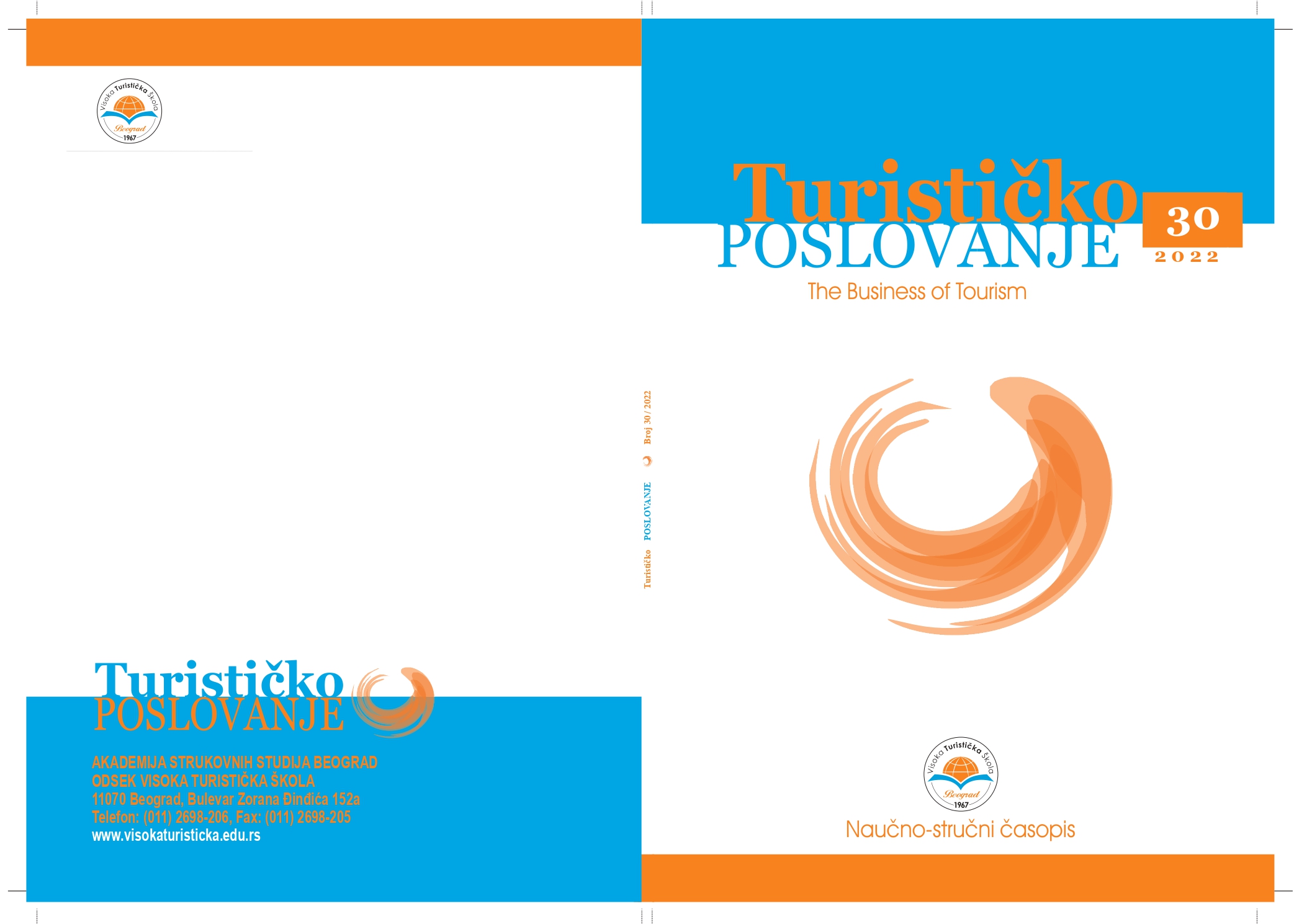THE INFLUENCE OF GASTRONOMIC OFFER AND SERVICES ON THE BRANDING OF HOTEL DIVČIBARE
Abstract
The gastronomic offer and restaurant service have always played a very important role in the branding of the hotel facilities. The following scales and methods used in paper to obtain research answers are: Demographic analysis, Correlation analysis, Mann Whitney test, Likert scales, Pearson's coefficient. Based on conducted research, respondents indicated that hotel gastronomic offer, loyalty, satisfaction and services provided, can greatly affect the branding of hotel Divčibare. The survey was conducted in September 2022 on a sample of 250 respondents. This study demonstrates how the caliber of the service and culinary selection affects the respondents' pleasure and guests’ loyalty. The addition of the study to the body of current knowledge, the contribution to more significant future research, and the identification of strategic solutions for improved hotel operations all serve as indicators of its significance.
References
1. Baldwin, C., Wilberforce, N., & Kapur, A. (2011). Restaurant and food service life cycle assessment and development of a sustainability standard. The International Journal of Life Cycle Assessment, 16(1), 40-49.
2. Chen, W. J., & Chen, M. L. (2014). Factors affecting the hotel's service quality: Relationship marketing and corporate image. Journal of hospitality marketing & management, 23(1), 77-96.
3. Demirçiftçi, T., & Kizilirmak, i. (2016). Strategic branding in hospitality: Case of Accor Hotels. Journal of Tourismology, 2(1), 50-64.
4. Dion, D., & Arnould, E. (2016). Persona-fied brands: managing branded persons through persona. Journal of Marketing Management, 32(1-2), 121-148.
5. Erkmen, E. (2019). Managing restaurant attributes for destination satisfaction: what goes beyond food? Administrative Sciences, 9(1), 19.
6. Errajaa, K., Legohérel, P., Daucé, B., & Bilgihan, A. (2021). Scent marketing: linking the scent congruence with brand image. International Journal of Contemporary Hospitality Management.
7. Gagić, S., Tešanović, D., & Jovičić, A. (2013). The vital components of restaurant quality that affect guest satisfaction. Turizam, 17(4), 166-176.
8. Gajić, T., Radovanović, M., Tretiakova, T., & Syromiatnikova, J. (2020). Creating brand confidence to gastronomic consumers through social networks–a report from Novi Sad. Journal of Place Management and Development.
9. Gordin, V., Trabskaya, J., & Zelenskaya, E. (2016). The role of hotel restaurants in gastronomic place branding. International Journal of Culture, Tourism and Hospitality Research.
10. Hanaysha, J. (2016). Testing the effects of food quality, price fairness, and physical environment on customer satisfaction in fast food restaurant industry. Journal of Asian Business Strategy, 6(2), 31-40.
11. Hernandez-Rojas, R. D., Folgado-Fernandez, J. A., & Palos-Sanchez, P. R. (2021). Influence of the restaurant brand and gastronomy on tourist loyalty. A study in Córdoba (Spain). International Journal of Gastronomy and Food Science, 23, 100305.
12. Ismail, T. A. T., Muhammad, R., Yusoff, N. M., & Shariff, M. S. M. (2016). The myth and reality of hotel brand and food quality: the case of hotel restaurants in Malaysia. Procedia-Social and Behavioral Sciences, 222, 382-389.
13. Kim, H. J., Park, J., Kim, M. J., & Ryu, K. (2013). Does perceived restaurant food healthiness matter? Its influence on value, satisfaction and revisit intentions in restaurant operations in South Korea. International Journal of Hospitality Management, 33, 397-405.
14. Konuk, F. A. (2019). The influence of perceived food quality, price fairness, perceived value and satisfaction on customers’ revisit and word-of-mouth intentions towards organic food restaurants. Journal of Retailing and Consumer Services, 50, 103-110.
15. Lu, A. C. C., Gursoy, D., & Lu, C. Y. (2015). Authenticity perceptions, brand equity and brand choice intention: The case of ethnic restaurants. International journal of hospitality management, 50, 36-45.
16. Manhas, P. S., & Tukamushaba, E. K. (2015). Understanding service experience and its impact on brand image in hospitality sector. International Journal of Hospitality Management, 45, 77-87.
17. Mun, S. G., Park, E. O., & Woo, L. (2022). Strategic target customers of food and beverage offerings in full-service hotels: Outside-hotel customers. International Journal of Hospitality Management, 102, 103159.
18. Nam, J., Ekinci, Y., & Whyatt, G. (2011). Brand equity, brand loyalty and consumer satisfaction. Annals of tourism Research, 38(3), 1009-1030.
19. Nicolaides, A. (2018). Ethical hospitality marketing, brand-boosting and business sustainability. African Journal of Hospitality, Tourism and Leisure, 7(1), 1-12.
20. Nirwandy, N., & Awang, A. A. (2014). Conceptualizing public diplomacy social convention culinary: Engaging gastro diplomacy warfare for economic branding. Procedia-Social and Behavioral Sciences, 130, 325-332.
21. Radović, V., & Keković, Z. (2014). Development a comprehensive food safety system in Serbia-A Narrative Review Article. Iranian journal of public health, 43(7), 889.
22. Rakić, M., & Rakić, B. (2010). Positioning and Differentiation of Traditional Serbian Food. ECONOMIC, 253.
23. Rather, R., & Sharma, J. (2016). Brand loyalty with hospitality brands: The role of customer brand identification, brand satisfaction and brand commitment. Pacific Business Review International, 1(3).
24. Rodríguez-López, M. E., del Barrio-García, S., & Alcántara-Pilar, J. M. (2020). Formation of customer-based brand equity via authenticity: The mediating role of satisfaction and the moderating role of restaurant type. International Journal of Contemporary Hospitality Management.
25. Šerić, M., & Gil-Saura, I. (2012). ICT, IMC, and brand equity in high-quality hotels of Dalmatia: An analysis from guest perceptions. Journal of Hospitality Marketing & Management, 21(8), 821-851.
26. Singh, R., & Nika, A. S. (2019). Influence of service quality on brand image and repeat patronage in hospitality industry: A content analysis. African Journal of Hospitality, Tourism and Leisure, 8(3), 1-19.
27. Woodside, A. G., Megehee, C. M., & Ogle, A. (Eds.). (2009). Perspectives on cross-cultural, ethnographic, brand image, storytelling, unconscious needs, and hospitality guest research. Emerald Group Publishing.
28. Yi, S., & Choi, J. (2012). Exploratory study on effects of restaurant attributes on perception of price and brand reputation-comparison between locals and tourists. Journal of the Korean Society of Food Culture, 27(5), 481-489.
29. Yi, S., Zhao, J., & Joung, H. W. (2018). Influence of price and brand image on restaurant customers’ restaurant selection attribute. Journal of foodservice business research, 21(2), 200-217.
30. Zrnić, M., Brdar, I., & Kilibarda, N. (2021). The importance of traditional food quality—the viewpoint of the tourism. Scientific journal" Meat Technology", 62(1), 69-76.

